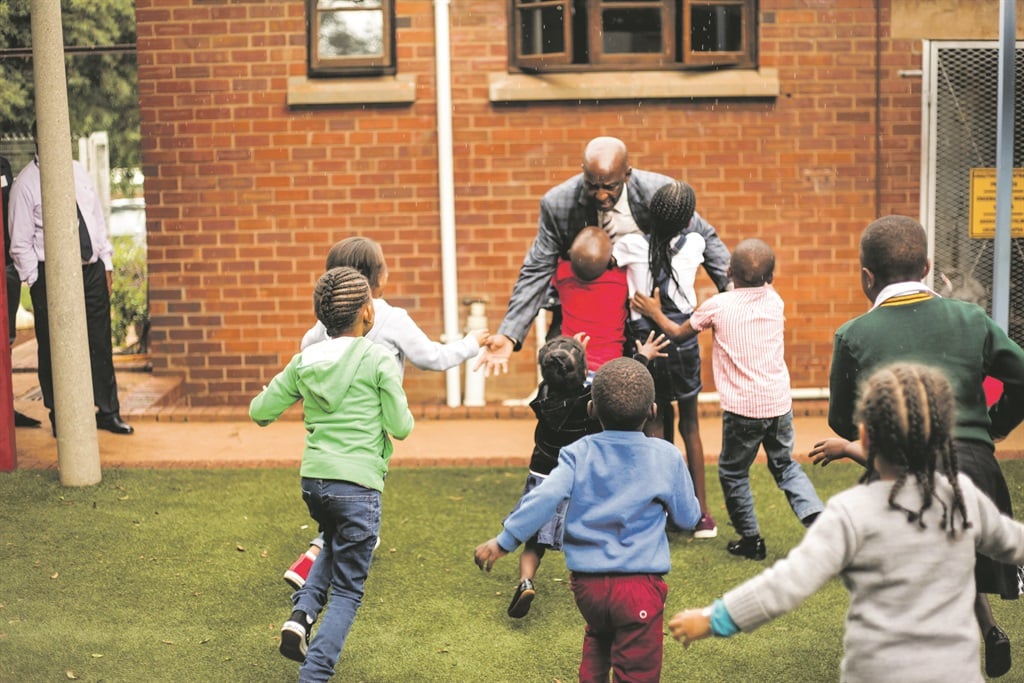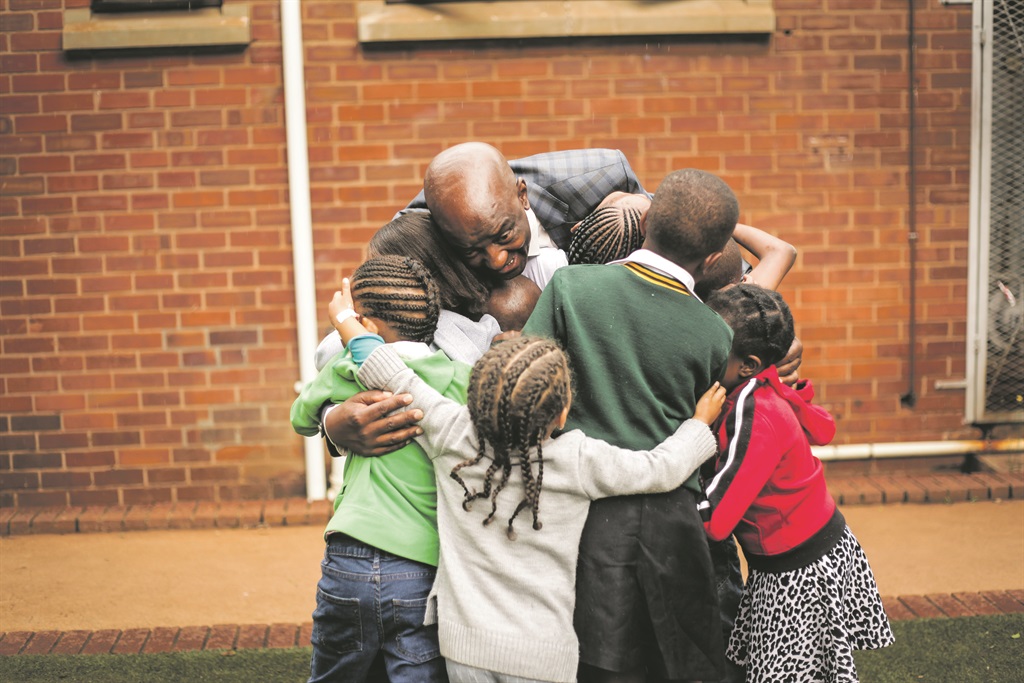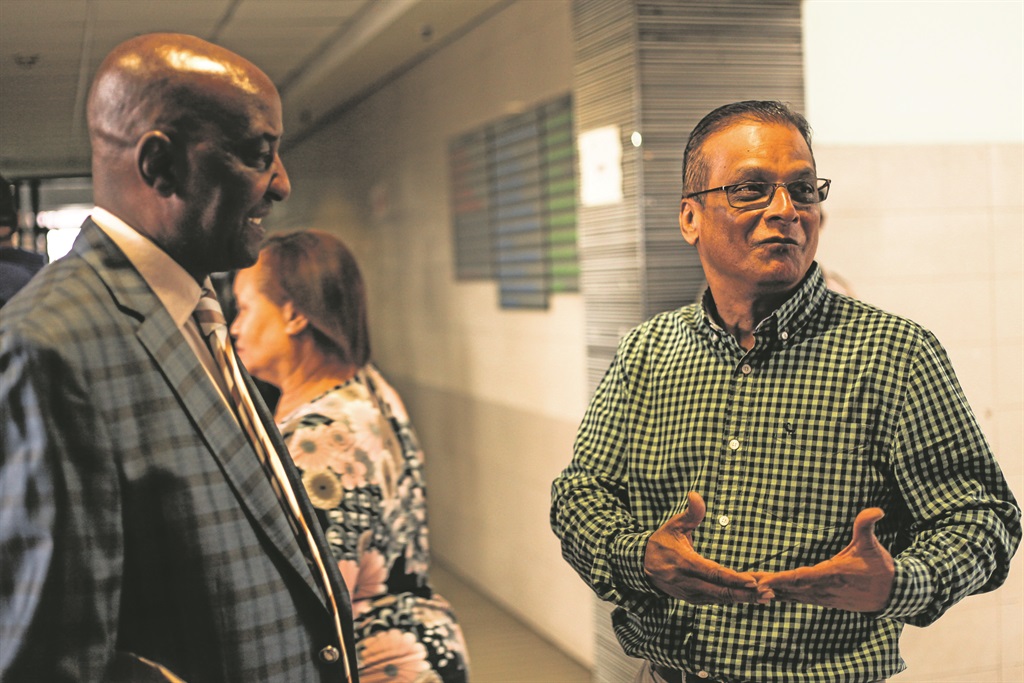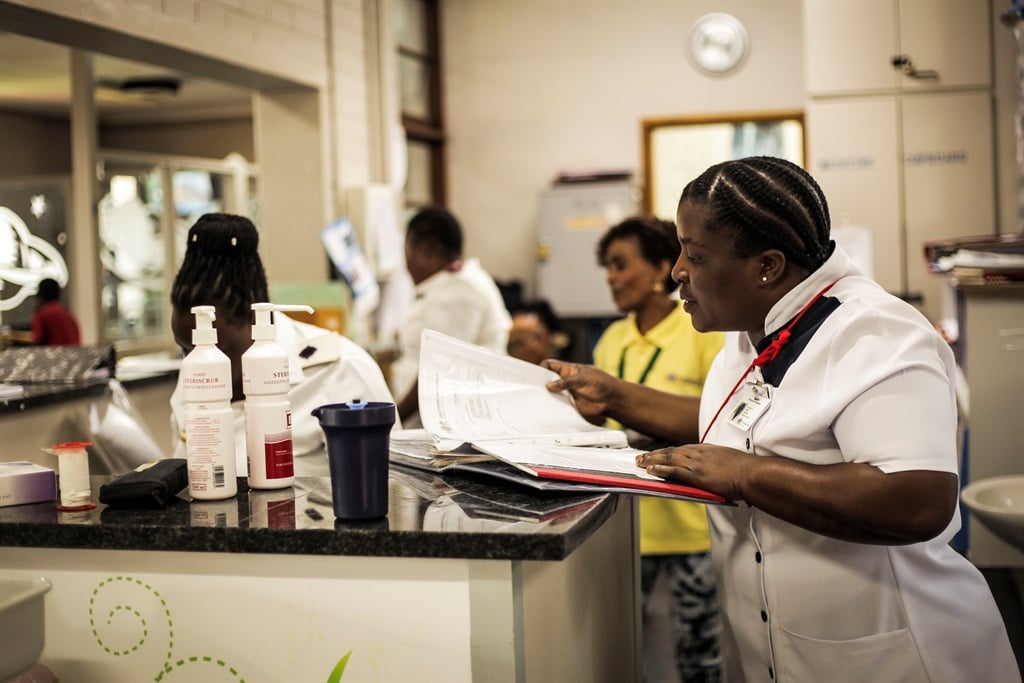
With her hands folded in prayer on her lap, a sorrowful mother’s head seems too heavy to lift and she can’t take one more look at her motionless daughter, fighting for her life in the hospital bed.
The sound of jubilant children playing outside on a jungle gym close to Ward 43 at Chris Hani Baragwanath Hospital filters into the room.
These are the children well enough to go out to play; others remain in their beds in the common ward area.
The sombre mood in the room where the mother sits, isolated, lifts as Siphiwe Msimang walks into the room.
Clean-shaven and neatly clad in a brown checked jacket with a matching shirt and tie, Msimang looks no different to any of the other medical professionals at Bara – except that he isn’t one.
This is the third time in the past few days that he has walked into this room.
The mother appears to have lost hope as Msimang walks in, armed only with soothing words for the heartbroken mother.
Her eyes, brimming with tears ready to trickle down her face, almost return to normal as Msimang offers her words of comfort.
“Talk to the living God ... he is good. Your child will get out of this situation ... miracles happen here, they fix people here at Bara,” he says.
“At least smile,” he coaxes. “You will be alright.”
By the time he walks out of the room the mother has had a few minutes of relief from her sorrow.
Sadly, two days later, her daughter dies, losing her battle with cancer.
“This is what I see almost every day of my life at Bara. At times you play with a child, run around with him now and the following day he is gone, just like that ... It’s so painful,” says the 64-year-old Msimang.
“At times you will find that the parent has already been informed of the minimal chance of survival for the child.
"While I may be aware of their imminent emotional pain, to help lessen their trauma I still tell them of miracles because I have seen young cancer patients survive the worst.
"The one thing I would not encourage is for parents and family to lose hope.”
The wisdom of his words and his place in the hospital’s community is not what you’d expect from a man who spent two decades working in the printing industry.
Almost 18 years ago Msimang left his job to become a full-time volunteer at Bara. Prior to that he volunteered on a part-time basis for about two years. This year marks 20 years at the hospital.
“In 2000 when the company I worked for got sold I went to Bara and said to them: ‘I’m all yours now; use me.’ They were worried I would demand a payment but I told them:
"‘No, it’s all about making a difference, one life at a time,’” Msimang, a father of two, says.
“I do what I love. Helping to raise funds, hosting birthday parties for patients and, to date, I have brought about 190 celebrities to entertain children and older patients at Bara.
“I’m living a miracle life. I don’t even notice I’m not getting paid a cent because I have my family and friends to thank for the support.”
City Press recently followed Msimang as he carried out his usual day on duty at Bara.
The man known to everyone at the hospital as “Malume” (Uncle) has got no fixed job description. He simply goes where he is needed – from the children’s ward to wards where there are older patients and he also visits high care.
His day starts with shouted greetings. “Malume,” people shout from all directions as he walks by. He stops to greet many, especially patients. He asks how they feel and whether they’re on the road to recovery.
Msimang is also quick to spot those who are struggling to get around or those who are lost.
“I can see you’re looking for the bathroom, aren’t you?” he asks a correctional service officer, escorting a chained offender in the corridor. Dressed in bright orange overalls, the offender is quick to respond and Msimang directs the man and his minder to the nearest bathroom.
It is not only the patients and the visitors who stop for a quick chat with Msimang. Nurses, doctors and administration staff all stop to chat to him too. He compliments some on how beautiful they are and wishes them a good day at work.
One thing he never allows is for anyone not to smile.
“I demand a smile from them. Everyone here is overwhelmed and others are depressed by their daily work. I demand that smile to uplift their spirits and they know they have to comply,” he says.
On our journey we meet Muzi Hlatswayo, a quality assurance officer at Bara.
“Umalume is my mentor ... he is highly involved in the day-to-day running of Bara. He will leave a huge gap here the day he decides to leave. I would really love to see the face of this legend on the facility’s hall of fame one day,” Hlatswayo says.
The head of the surgical unit, Dr Khairul Mustafa, also stops to shake hands with Msimang.
“I have been at Bara for 28 years and have known Malume since 2003. He is a father figure to everyone here and we learn a lot from him on a daily basis by the way he handles patients’ cases.
“We have learnt from him just what it takes to make a little difference in someone’s life. He does it from the heart and expects nothing in return,” Mustafa says.
Msimang does everything from wheeling patients to theatre and comforting them before they go under the knife, to helping bath and feed them.
We continue our walk through the maze of corridors, a walk made much longer by Malume who stops every minute or so to interact with people. We soon come to his favourite wards – 43 and 44 – which are where young cancer patients are cared for.
“Malume!” a young girl playing outside the ward shouts when she sees Msimang. Others join in, calling him, and they all run to him for an affectionate group hug.
He proceeds to the ward where nurses and other patients greet him with the same energy.
One nurse, Sizakele Mngomezulu, says the cancer ward would not be the same without “Malume”.
“He goes around looking for wheelchair donations and he fixes broken ones. He helps bath and feed patients and he is good with young patients, especially boys, whom he talks to like a father and helps them deal with their cancer even better,” she says.
“He inspires us as nurses very much as well, lifts our spirits with his energy ... he will just say ‘smile’ and you won’t be the same afterwards even if you were feeling down to begin with.
“Malume also does regular visits to cancer survivors after they are discharged from hospital and comes to tell us how others, once diagnosed at a tender age, are now working as teachers or a nurses ... That gives us joy, but mostly he inspires us to do more good work.”
Even when he is not helping out with wheelchairs or patient care, Msimang leaves faces beaming and brimming with a refreshed sense of hope.
“He has the ability to reach out to patients more than any doctor can. Patients open up to him more than any other medical staff ... he jokes a lot and puts a smile on many faces,” says Dr Steve Mankupane, a clinical director.
“There are those patients who somehow feel ashamed to be at Bara, but he changes all of it and tells them the hands that are handling them here are the same professional ones that would care for them at any private institution.”
Nursing director Duduzile Ngidi described Msimang as a committed volunteer who goes beyond the call of duty.
“He does a lot of good, more than us as professionals. He is a big part of the rehabilitation process.
"He does not do only parties for patients; he also cares a lot about the nurses as well. Now and then he offers tickets to nurses to go and watch plays or musicals shows at theatre,” Ngidi says.
There is one thing Msimang would love to see change in health facilities.
“Families must understand that patients need everybody’s support ... seeing patients struggling on their own to walk and move from one hospital section to the next where they are expected to join queues is heart-rending.
“Our people must learn to show their loved ones love and support when they are still alive and not when they are dead,” he says.
“One thing – people must visit patients in hospital and not ask them if they think they will be fine, but rather give them hugs and tell them they will be fine and tell them just how much they are loved.”
Walking out of Bara at the end of his eight – sometimes more – hours, Msimang takes a taxi back to his home in Diepkloof not to relax but to think of his next project. Next month, for example, he is planning a party for 31 children who were born as twins, triplets and quadruplets at Bara.
When he does finally relax, he kicks off his shoes, sits back and listens to the soothing sounds of jazz.
“I play jazz so that I can take my mind off things. I see a lot and always think if it would be the same if it was my own family member lying there in ICU ... It is not easy but I love what I am doing and feel complete and fulfilled after a day at work,” he says.




 Publications
Publications
 Partners
Partners













